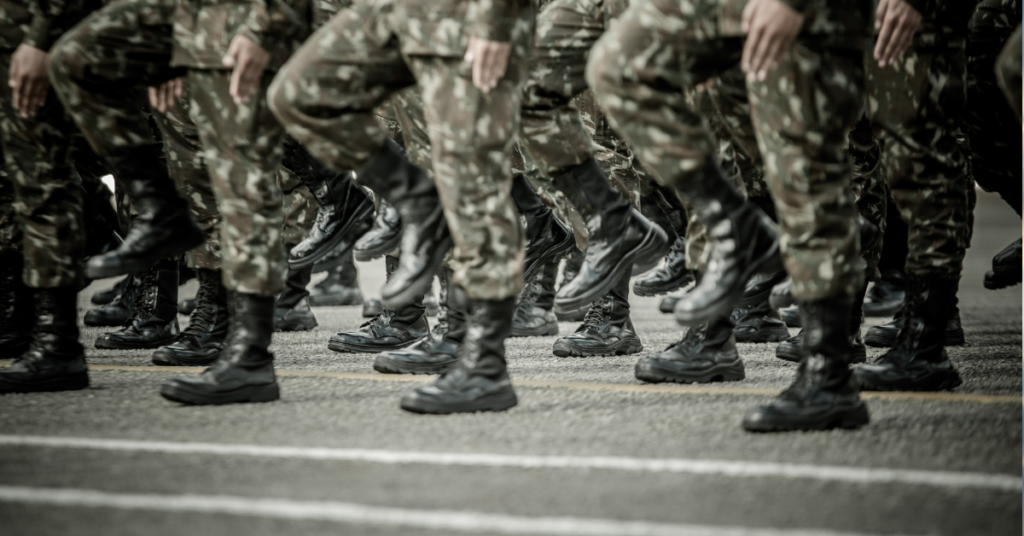
If you are an active duty service member seeking legal clarity or an individual interested in military law, it is important to have a thorough understanding of the UCMJ, including common violations.
Whether you require legal assistance for a UCMJ violation or seek guidance on military law matters, it is important to understand the multifaceted legal landscape within the military, and when you may need a UCMJ attorney.
Does the US military employ lawyers?
Absolutely! The United States military does have their own lawyers who serve in various legal capacities. These military lawyers are vital in advising commanders, representing service members in legal proceedings, and making sure they comply with military laws and regulations. The Army, Navy, Air Force, Marines, and Coast Guard all have a legal branch called the Judge Advocate General Corps.
What is a military lawyer?
A military lawyer’s deep understanding of military law, regulations, and procedures distinguishes them from civilian attorneys.
Military lawyers handle a wide array of legal matters, such as advising commanders on legal issues, preparing cases for courts-martial, representing service members during investigations, and providing legal assistance services. They also make sure military personnel comply with the UCMJ and protect the rights of military personnel.
What rank are lawyers in the military?
Military lawyers hold both legal qualifications and military rank. The rank of military lawyers varies depending on their experience, responsibilities, and branch of service. Military lawyers typically hold a rank equivalent to a second lieutenant or ensign upon commissioning as officers. Their rank can increase to captain, major, lieutenant colonel, colonel, and even general or admiral.
While military lawyers have rank, their primary focus is on providing legal services and expertise rather than being in combat or command. Their legal expertise and specialized training enable them to fulfill their duties effectively, ensuring the proper administration of justice within the military.
Do you have to be in the military to be a JAG attorney?
To become a JAG attorney, individuals must meet the requirements to join the military as officers. The JAG Corps exclusively serves within the military justice system and provides legal support to service members. As a result, military lawyers must be active duty or reserve armed forces members.
Individuals typically undergo a selective application and screening process to pursue a career as a JAG attorney. They have to have a law degree and pass the bar exam. Once accepted, the candidate pursues specialized legal training through the JAG Corps. That additional education and training is important for them to navigate the intricacies of military law successfully.
What is a JAG lawyer? Are they like their TV counterparts?
The term “JAG lawyer” has become popularized on TV shows like “JAG” and “NCIS,” which feature stories about military lawyers and their work. While these shows may not fully reflect the realities of military law practice, they have contributed to the familiarity and recognition of the term “JAG lawyer.”
What does a military lawyer do to serve military personnel?
Military lawyers perform diverse legal duties within the military justice system. Their responsibilities include:
Advising commanders on legal matters
Military lawyers guide commanders on issues such as applying military law, rules of engagement, and compliance with international laws and treaties.
Representing service members
Military lawyers may represent service members in court-martial cases, administrative hearings, and investigations.
Providing legal assistance
Military lawyers also offer legal assistance to service members and their families on personal matters, including family law issues, estate planning, consumer rights, and landlord-tenant disputes.
Conducting legal research
Military lawyers may conduct legal research to stay updated on changes in military law, regulations, and court precedents in order to provide accurate advice to commanders, service members, and their families.
Drafting legal documents
Military lawyers prepare legal documents such as contracts, wills, powers of attorney, and military administrative paperwork. Their attention to detail and understanding of military regulations ensure that these documents meet the necessary legal requirements.
Can JAG represent you in a civil matter?
Generally, JAG attorneys primarily focus on legal matters within the military justice system and provide legal assistance to military personnel and their families. However, their scope of representation is limited to military-related issues.
If you need assistance with a personal injury case, divorce, or estate planning unrelated to military service, you should find a civilian lawyer specializing in military law. These civilian attorneys possess the expertise to navigate civilian and military legal frameworks and can provide comprehensive guidance in such cases.
Whether or no legal assistance is available varies depending on the resources and policies of each military branch. If you’re in the service, your local JAG office or legal assistance program can help you find legal representation.
What is the UCMJ in the Army?
The Uniform Code of Military Justice governs the conduct of United States armed forces members. It applies to all military branches and establishes the rules and regulations under which service members operate.
The UCMJ articles are the legal foundation for maintaining good order and discipline within the ranks in the Army. It outlines offenses, procedures for courts-martial, and the rights of service members during legal proceedings. The UCMJ covers various military offenses, from minor infractions, such as UCMJ uniform regulations, to serious crimes, and sets forth the corresponding punishments.
What is a UCMJ violation?
A UCMJ violation refers to breaching one or more articles outlined in the Uniform Code of Military Justice. These violations include offenses such as unauthorized absence, insubordination, disrespect, theft, assault, or even more severe crimes like espionage or mutiny.
UCMJ violations are typically addressed through a military justice process involving investigations, non-judicial punishment (Article 15), or formal court-martial proceedings. The severity of the violation and its impact on military discipline and readiness will determine the appropriate legal course of action.
Understanding the UCMJ is important for service members to comply with military law and protect their military status and future.
What is the right to counsel in the UCMJ?
The right to counsel is a fundamental legal right granted to service members facing charges under the UCMJ. It ensures that individuals accused of UCMJ violations have the right to legal representation throughout the legal process.
The right to counsel guarantees service members access to a qualified attorney who can provide legal advice, advocate, and protect their rights during various investigations and legal proceedings. This right is critical to ensure a fair and just legal process within the military justice system.
Military lawyers, including JAG officers, can counsel service members facing UCMJ charges. They possess the specialized knowledge and experience in military law and procedures necessary to represent and defend service members in legal proceedings effectively.
When should you call an attorney for a UCMJ violation?
If you face a UCMJ violation or are under investigation, you should contact UCMJ lawyer near you specializing in military law immediately. Working with a lawyer as early as possible in the process can impact the outcome of your case.
Here are some situations when you should consider reaching out to an attorney for UCMJ matters:
When you learn of an investigation
If you find out you’re under investigation for a potential UCMJ violation, an attorney can help you understand your rights, navigate the investigative process, and develop a strategic approach to your defense.
When facing non-judicial punishment (Article 15)
If you are notified of non-judicial punishment, your attorney will assess the potential consequences, explore defense strategies, and make sure your rights are protected.
Before a court-martial
If you’re scheduled to appear in a court-martial, get a lawyer. Preferably, an attorney experienced in military law who can analyze the evidence, prepare your defense, cross-examine witnesses, and advocate for the best possible outcome.
When considering an appeal
If you have been convicted in a court-martial and are contemplating an appeal, an attorney can get you through the appellate process, review the trial record for errors, and advocate for you in the appellate courts.
Seeking legal counsel from a qualified attorney specializing in military law, with experience in UCMJ cases, may be necessary for a positive outcome in your case.
Understanding UCMJ punishments and the role of military lawyers is essential for service members navigating the complexities of the military justice system. By recognizing the right to counsel and knowing when to engage the services of an attorney, individuals can protect their rights, receive sound legal advice, and achieve the best possible outcomes. When facing UCMJ challenges, seeking the guidance of a qualified attorney specializing in military law is crucial. With their expertise, you can confidently navigate the legal landscape and safeguard your interests within the military justice system.
If you are a servicemember facing potential UCMJ violations, it is essential to seek the assistance of a military attorney, particularly those who specialize in military law. While civilian lawyers specializing in military law near you may be available, it is highly advisable to retain former JAG attorneys. These legal professionals have extensive military law experience and a deep understanding of the UCMJ. Their knowledge of military protocols, courtroom procedures, and the specific challenges servicemembers face can greatly benefit your case. In situations involving a potential wrongful military discharge, a dedicated wrongful military discharge attorney can provide invaluable support. By leveraging their expertise in military law, these attorneys can ensure that your rights are protected and that any unjust actions are addressed appropriately. With their dedication to upholding justice and their commitment to representing servicemembers, a military attorney, particularly a former JAG attorney, can provide you with exceptional legal counsel and representation throughout the UCMJ process.

